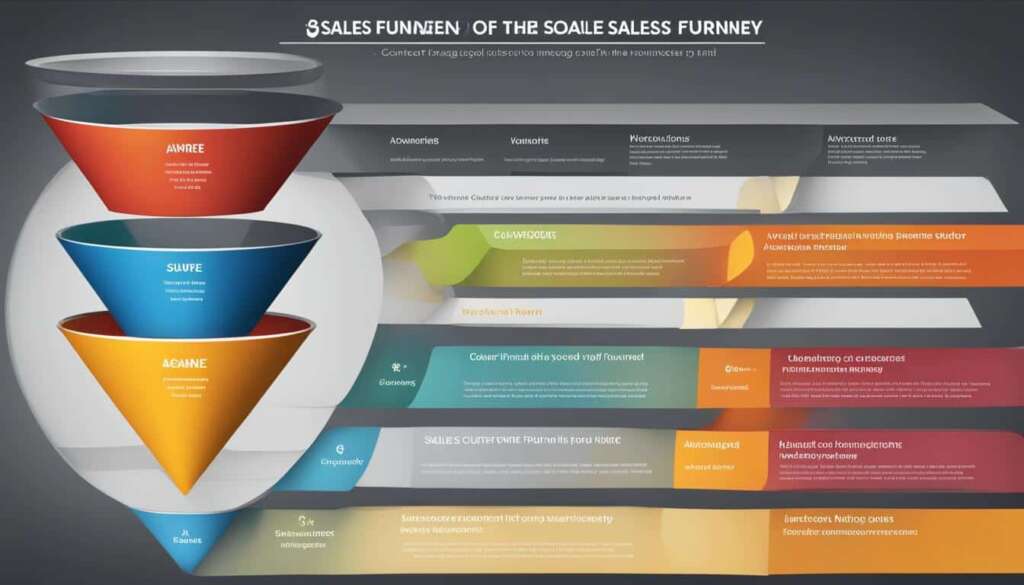Table of Contents
If you’re looking to improve your sales process and transform your customer’s journey into revenue, it’s crucial to understand the concept of sales funnels. A sales funnel is essentially a visual representation of the customer journey from initial awareness to final conversion. It’s a strategic approach to guide potential customers towards making a purchase, ensuring that the process is as smooth and efficient as possible.
By defining and optimizing your sales funnel, you can identify potential bottlenecks in the process and address them accordingly. This can greatly improve your overall sales performance and ultimately, your revenue.
Key Takeaways:
- Understanding sales funnels is crucial for improving your sales process and maximizing revenue
- A sales funnel is a visual representation of the customer journey from initial awareness to final conversion
- Optimizing your sales funnel can identify potential bottlenecks and improve overall sales performance
- The purpose of a sales funnel is to guide potential customers towards making a purchase
- By implementing an effective sales funnel, you can streamline the customer journey and increase conversions
What is a Sales Funnel?
A sales funnel is a marketing and sales framework that outlines the journey a customer takes towards purchasing a product or service. It is a visual representation of the customer’s progression from initial awareness to making a final purchase, typically depicted in the shape of a funnel. (Note: insert relevant image here with alt attribute containing “sales funnel”)
At the top of the funnel, customers become aware of your business and what it has to offer. This is known as the “awareness” stage, where you generate leads and introduce potential customers to your brand. As customers move down the funnel, they become more interested in your products or services, leading to the “interest” stage, where you engage with them and provide more detailed information.
The “decision” stage follows, where customers are considering making a purchase and require further persuasion to do so. Lastly, the “action” stage, where customers make a final purchase and hopefully become repeat customers.
Understanding the structure and purpose of a sales funnel is crucial for effective marketing and sales strategies. By optimizing each stage of the funnel, you can maximize conversions and ultimately increase your revenue potential.
The Importance of Sales Funnels in Maximising Revenue
Implementing an effective sales funnel is crucial for any business aiming to boost its revenue. The sales funnel helps nurture leads and prospects as they move down the path to purchase. By streamlining your customer’s journey, you can optimise conversions and increase your overall profitability.
A well-structured sales funnel has several stages, each designed to move the prospect closer towards becoming a customer. The stages typically include awareness, interest, decision, and action. Effective lead generation and conversion tactics are essential within each stage to move the prospect further along.
One of the main advantages of a sales funnel is its ability to qualify prospects. As leads go through each stage, they become increasingly engaged and interested in the product or service, making them more likely to convert into paying customers. Additionally, the data gathered from each stage of the funnel can help businesses identify areas for improvement and optimisation.
“A well-defined sales funnel is the backbone of any successful business, ensuring that leads and prospects receive the attention they deserve, and ultimately maximising revenue.”
In conclusion, the benefits of a sales funnel cannot be overstated. By understanding and implementing this concept, businesses can enhance their customer’s journey, increase leads, and ultimately boost their revenue potential.
Conclusion
To sum up, sales funnels are an integral component of any successful marketing and sales strategy. By guiding potential customers through each stage of the funnel, you can effectively nurture leads and maximize revenue potential. Keep in mind that lead generation and conversion tactics are equally critical within the sales funnel. It is crucial to focus on creating high-quality content that resonates with your target audience and encourages them to take action.
Remember, a well-defined sales funnel can lead to greater marketing success and significantly impact your business’s profitability. So, take the time to develop a comprehensive sales funnel that aligns with your business goals and target audience. With dedication and persistence, you can transform your customer’s journey into a profitable sales process and achieve long-term success.
FAQ
What is a sales funnel?
A sales funnel is a visual representation of the customer journey in a step-by-step process, from initial awareness to final conversion. It helps businesses understand and optimize their sales process by guiding prospects through each stage of the funnel.
How does a sales funnel work?
A sales funnel works by attracting potential customers (top of the funnel), nurturing them with valuable content and offers (middle of the funnel), and converting them into paying customers (bottom of the funnel). It involves different marketing and sales strategies tailored to each stage to maximize conversions.
Why are sales funnels important in maximizing revenue?
Sales funnels are crucial in maximizing revenue because they help businesses systematically nurture leads, qualify prospects, and guide them towards making a purchase. A well-designed sales funnel ensures that prospects are engaged, informed, and motivated to convert, leading to higher sales and revenue.
How can a sales funnel improve overall sales process?
A sales funnel improves the overall sales process by providing a clear framework for businesses to understand their customers’ journey. It allows them to identify potential bottlenecks, optimize each stage of the funnel, and implement targeted marketing strategies to increase conversion rates and sales efficiency.
What role do effective lead generation and conversion tactics play in a sales funnel?
Effective lead generation and conversion tactics are critical components of a successful sales funnel. Lead generation strategies attract potential customers to the top of the funnel, while conversion tactics, such as compelling calls to action and personalized offers, help move prospects through the funnel towards making a purchase.
How can implementing a well-defined sales funnel benefit my business?
Implementing a well-defined sales funnel can benefit your business in various ways. It helps streamline your customer’s journey, increases conversion rates, and improves overall sales efficiency. By guiding prospects through each stage of the funnel, you can nurture relationships, build trust, and ultimately boost your business’s profitability.
What are the different stages of a sales funnel?
The different stages of a sales funnel typically include awareness, interest, evaluation, decision, and action. Each stage represents a specific point in the customer’s journey, where they move from being aware of your product or service to making a purchase decision and taking action.













